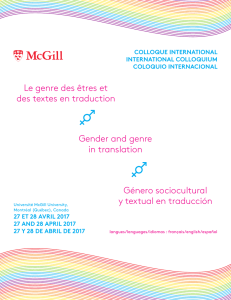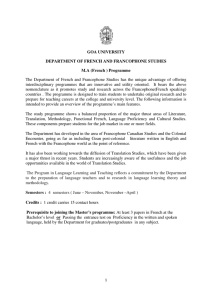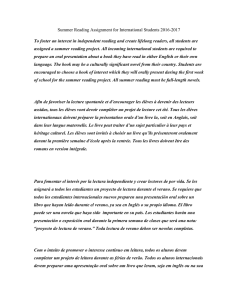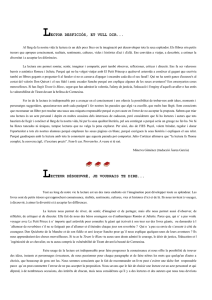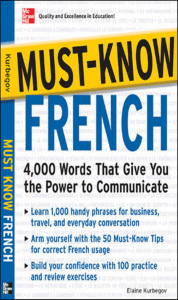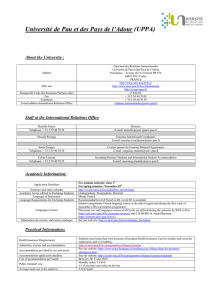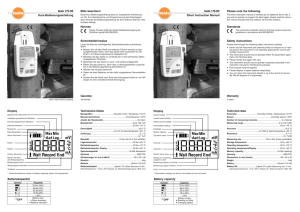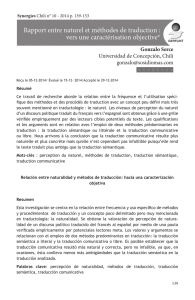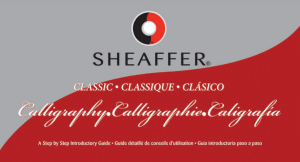BA Honours French
Anuncio
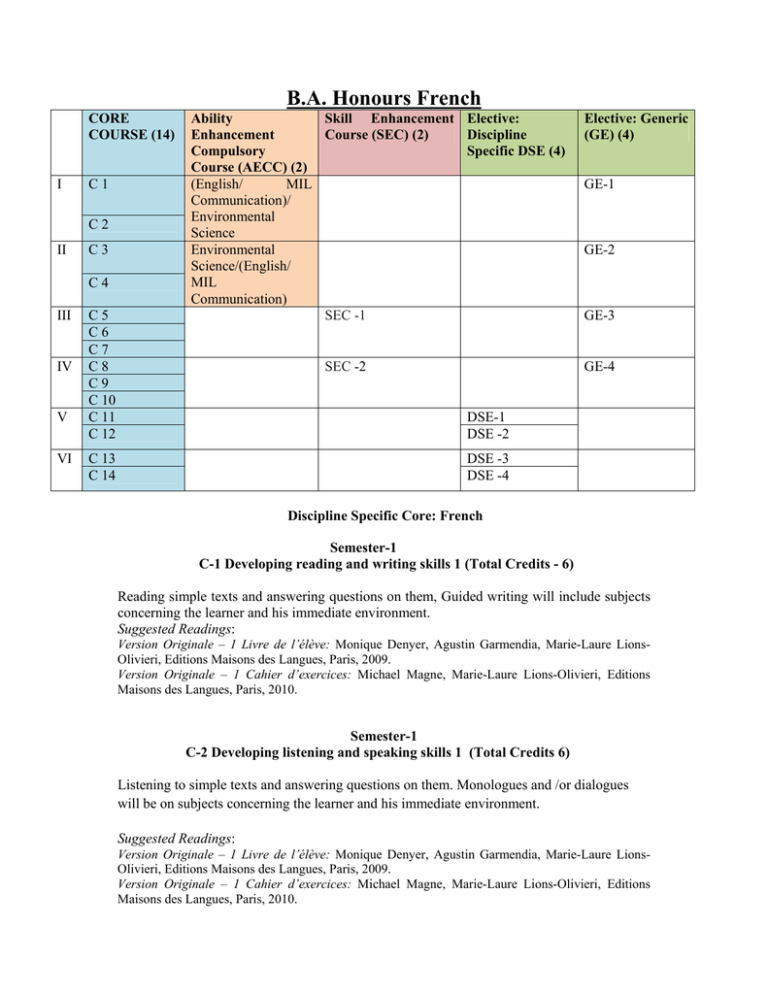
B.A. Honours French CORE COURSE (14) I C1 C2 II C3 C4 III IV V VI C5 C6 C7 C8 C9 C 10 C 11 C 12 Ability Skill Enhancement Elective: Enhancement Course (SEC) (2) Discipline Compulsory Specific DSE (4) Course (AECC) (2) (English/ MIL Communication)/ Environmental Science Environmental Science/(English/ MIL Communication) SEC -1 SEC -2 Elective: Generic (GE) (4) GE-1 GE-2 GE-3 GE-4 DSE-1 DSE -2 C 13 C 14 DSE -3 DSE -4 Discipline Specific Core: French Semester-1 C-1 Developing reading and writing skills 1 (Total Credits - 6) Reading simple texts and answering questions on them, Guided writing will include subjects concerning the learner and his immediate environment. Suggested Readings: Version Originale – 1 Livre de l’élève: Monique Denyer, Agustin Garmendia, Marie-Laure LionsOlivieri, Editions Maisons des Langues, Paris, 2009. Version Originale – 1 Cahier d’exercices: Michael Magne, Marie-Laure Lions-Olivieri, Editions Maisons des Langues, Paris, 2010. Semester-1 C-2 Developing listening and speaking skills 1 (Total Credits 6) Listening to simple texts and answering questions on them. Monologues and /or dialogues will be on subjects concerning the learner and his immediate environment. Suggested Readings: Version Originale – 1 Livre de l’élève: Monique Denyer, Agustin Garmendia, Marie-Laure LionsOlivieri, Editions Maisons des Langues, Paris, 2009. Version Originale – 1 Cahier d’exercices: Michael Magne, Marie-Laure Lions-Olivieri, Editions Maisons des Langues, Paris, 2010. Semester-2 C-3 Language in Context: Developing reading and writing skills – 2 (Total Credits 6) Describing past events, reading, writing and understanding short texts including news items, instructions for use, emails, logs, classified advertisements, biographies, invitations.Internet forums. Suggested Readings: Version Originale – 2 Livre de l’eleve: Monique Denyer, Agustin Garmendia, Corinne Royer, MarieLaure Lions-Olivieri, Editions Maisons des Langues, Paris, 2010. Version Originale –2: Cahier d’exercices: Laetitia Pancrazi, Editions Maisons des Langues, Paris, 2010. Semester-2 C-4 Intermediate level reading and writing skills -1 (Total Credits 6) Asking for and giving instructions, narrating past events and future plans, commenting on and presenting simple texts, describing visual materials (photos, pictures, etc.), reading, understanding and preparing posters (theatre, film, books). Suggested Readings: Version Originale – 2 Livre de l’eleve: Monique Denyer, Agustin Garmendia, Corinne Royer, MarieLaure Lions-Olivieri, Editions Maisons des Langues, Paris, 2010. Version Originale –2: Cahier d’exercices: Laetitia Pancrazi, Editions Maisons des Langues, Paris, 2010. Semester-3 C-5 Developing intermediate level speaking and listening skills -2 (Total Credits 6) Summarizing a film, preparing and conducting an opinion poll, conducting an interview, working with songs. Suggested Readings: Version Originale – 3 Livre de l’eleve (Unités 1-5) Monique Denyer, Christian Ollivier, Emilie Perrichon, Editions Maisons des Langues, Paris, 2011. Version Originale –3 Cahier d’exercices (Unités 1-5): Laetitia Pancrazi,Stéphanie Templier Editions Maisons des Langues, Paris, 2011. Semester-3 C-6 Studying Different text types (Total Credits 6) Studying different text types to familiarize oneself with different kinds of language usages and styles including reading and understanding instructions for use, classified advertisements, biographies informative texts, short scientific texts, writing a film critique, summarising a press article, analysing and writing a summary of opinion poll results, reading a comic strip, writing a dialogue for a comic strip. Different language registers, understanding word formation. Preparing a slam. Suggested Readings: Version Originale – 3 Livre de l’eleve (Unités 1-5) Monique Denyer, Christian Ollivier, Emilie Perrichon, Editions Maisons des Langues, Paris, 2011. Version Originale –3 Cahier d’exercices (Unités 1-5): Laetitia Pancrazi,Stéphanie Templier Editions Maisons des Langues, Paris, 2011. Semester-3 C-7 Advanced reading and writing skills(1) (Total Credits 6) Comparing headlines and presentation of news in different newspapers, analysing an editorial, writing a short story, reading and analysing texts/articles on different social issues.Preparing a blog, analysing and writing a summary of opinion poll results. Suggested Readings: Version Originale – 3 Livre de l’eleve (Unités 6-9) Monique Denyer, Christian Ollivier, Emilie Perrichon, Editions Maisons des Langues, Paris, 2011. Version Originale –3 Cahier d’exercices (Unités 6-9): Laetitia Pancrazi,Stéphanie Templier Editions Maisons des Langues, Paris, 2011. Semester-4 C-8 Developing advanced reading and writing skills (2) (Total Credits 6) Describing and comparing education systems, reading and analyzing texts/articles on various social issues, writing an open letter to the authorities, writing a petition, describing and analyzing cultural representations, writing a short story, writing blogs. Suggested Readings: Version Originale – 3 Livre de l’eleve (Unités 6-9) Monique Denyer, Christian Ollivier, Emilie Perrichon, Editions Maisons des Langues, Paris, 2011. Version Originale –3 Cahier d’exercices (Unités 6-9): Laetitia Pancrazi,Stéphanie Templier Editions Maisons des Langues, Paris, 2011. Semester-4 C-9 Debating on various social issues(Total Credits 6) Preparing, conducting and presenting results of opinion polls on various social issues, preparing and presenting a skit. Debates, oral presentations on various social issues, narrating one’s experiences of foreign language learning Suggested Readings: Version Originale – 4 Livre de l’eleve (Unités 1-5) Fabrice Barthélémy, Christine Kleszewski, Emilie Perrichon, Sylvie Wuattier Editions Maisons des Langues, Paris, 2012. Version Originale –4 Cahier d’exercices (Unités 1-5): Laetitia Pancrazi, Editions Maisons des Langues, Paris, 2012. Semester-4 C-10 History of France in relation to Europe and History of French Speaking Countries (Total Credits 6) The major social, political and cultural events from the medieval to contemporary period. The Gauls and the Franks. The making of the Kingdom of France (987-1453). Consolidation of the French Monarchy. French Revolution and the Napoleonic era. Rise of Republican thought in the 19th century and the 3rd Republic with special emphasis on its policy towards education. France and its colonies. Contemporary France and its relations with the French speaking world including its policy towards immigration. Texts Jean Thoraval et al, Les Grandes Etapes De La Civilisation Française, Bordas (1967). Jean Meyer, Jean Tarrade, Annie Rey-Goldzeiguer, Histoire de la France coloniale, en trois volumes, Armand Colin, coll. Agora (1991). Marc Ferro, Histoire des colonisations. Des conquêtes aux indépendances. 13e au 20e siècle, Seuil, 1996. Pascal Blanchard, La France noire : Présences et migrations des Afriques. des Amériques et de l'océan indien en France, Editions de la Découverte(2012). Guillaume Devin and Guillaume Courty, La construction européenne, La Découverte, coll. Repères(2010). Semester-5 C-11 History of French And Francophone Literature (Total Credits 6) A selection of literary texts with focus on the major cultural and intellectual movements from the nineteenth century to contemporary times. This will include samples of writings from the medieval period, the Renaissance, the French Enlightenment, Romanticism and the realist novels, Symbolic and Surrealist poetry. Exotic, travel and Colonial writing will raise questions on French encounter with otherness. Excerpts from the works of Francophone writers will be introduced. Suggested Readings: Le langage – le théâtre, la parole et l’image, Vol 1, Ferdinand Nathan, 1974. Le Conte – la poèsie, Vol.2, Ferdinand Nathan, 1974. Le Roman-le récit non romanesque, le cinéma, Vol. 3, 1974. Anthologie de la littérature française et européenne, Valette, Giovaacchini et al, F. Nathan, 1993. Littérature, textes et documents, D. Renée and B. Lecherbonnier, Du Moyen Age au 20e siecle, 5 volumes, collection dirigée par Henri Mitterand, Nathan, 1986. Du Moyen Age au XXe siècle, 5 volumes, Itinéraires littératires, collection dirigée par G. Décole, Hatier, 1988. Jean-Louis Joubert, Litterature Francophone Anthologie, Cideb, 1997 Semester-5 C-12 Introduction to Translation (Total Credits 6) 1. Study of language used in industries such as hospitality, tourism, banking, business sectors and translation of texts in the chosen areas (including birth, educational qualification, marriage, death, certificates, mark sheets). 2. Introducing the student to the techniques of translation; 3. Scientific and Technical translation. Translation of sacred texts. 4. 5. 6. 7. 8. Making of word glossaries in above fields. Reading of parallel literature on texts chosen for translation. Role of Translation in Multimedia contexts. Machine translation and its limitations Ethics and accountability in translation. Suggested Readings: 1. Extracts from Susan Bassnett McGuire: Translation Studies (2002). 2. Daniel Gile, Basic Concepts and Models for Interpreter and Translator Training John Benjamins Publishing(2009). 3. Jeremy Munday, Introducing Translation Studies, Theories and Applications New York: Routledge (2012) 4. Malmkaer Kirsten, Windle, Kevin. The Oxford Handbook of Translation Studies Oxford: OUP (2011). 5. Baker, Mona. In Other Words.A Course Book in Translation. New York: Routledge (2011). Semester-6 C-13 Rhetorics and Composition (Total Credits -6) Definition and study with examples of 1. Common figures of speech: Metaphors, Similes, Metonyms, Hyperboles, Personification, Alliteration, Oxymoron and Synecdoche. 2. Literary Tropes: Humour and Irony, Puns, Tautology, Allegories, Allusions, Apologia, Clichés, Euphemism, Climax and Anticlimax, Paradox, Analogies. 3. Idioms and Proverbs with their historical origin. 4. Different literary genres: Myths, Epics, Chivalric romances, Picaresque novel, Comedy, Tragicomedy and Farce, Satires, Biography, Autobiography and Memoirs, Essays and Epistles, Social Realism., Travel Literature Texts: Beckson, Karl and Ganz, Arthur. Literary Terms, A Dictionary. Delhi: Rupa (1960, 1991). Readings Dominique Coutant-Defer, Comment rédiger un commentaire composé?, Editeur : Le PetitLitteraire(2014). Dominique Coutant-Defer , Comment rédiger une fiche de lecture?, Editeur : le PetitLitteraire(2014). Alexis Chabot, Culture générale : Méthodologie de la dissertation, Ellipses Marketing (2004). Semester-6 C-14 Reading Literature (Total Credits 6) A selection of literary and visual texts with focus on the major cultural and intellectual movements from the origins to the eighteenth century. This will include literary works from medieval romances and farces, Renaissance, Classicism and Enlightenment. Recommended Readings and Viewings Historical Films : Jeanne d'Arc (1999); Le Roi danse, (2000) Danton (1983), L'Anglais et le Duc (2001); Vatel; (2000) Les Adieux a la reine (2012) Novels Anonymous, Le roman de Renart Rabelais, Pantagruel Mme de La Fayette, La Princesse de Clèves Voltaire, Candide ou l’optimisme Rousseau, Les rêveries du promeneur solitaire Plays Anonymous, La Farce de Maitre Pathelin Molière, Le Bourgeois gentilhomme Pierre Corneille, Le Cid Beaumarchais, Le Mariage de Figaro Short texts and Poetry Marguerite de Navarre, L’Heptaméron Jean de la Fontaine, Fables Charles Perrault, Conte de ma mère l’Oye Pierre de Ronsard, Sonnets pour Hélène Joachim Du Bellay, Les Regrets Discipline Specific Elective (DSE) Semester V and VI DSE -1 History of French Language, different language registers (Total Credits 6) History of the French language from the medieval period till present times. Status of regional in the 19th century in the aftermath of the French Revolution. History of the French language in the colonies. Understanding different registers. Comparison of colloquial French and the language of literary texts. Differences in French articulation/pronunciation within France as well as with relation to the French speaking-world with the help of film and, TV and U-Tube resources. Readings Michèle Perret , Introduction à l'histoire de la langue française, Armand Colin (2008). Bernard Cerquiglini, La naissance du français, PUF, Que sais-je ?(2013). http://www.axl.cefan.ulaval.ca/francophonie/francophonieacc.htm. Louis-Jean Calvet, Linguistique et colonialisme, Payot, 2002 Semester V and VI DSE – 2 Introduction to Consecutive and Simultaneous Interpretation from French to Hindi/ English/Regional Languages in Language Laboratory (Total Credits 6) Unit 1: Different Modes of Interpretation Booth behaviour and microphone manners Unit 2: Economising voice Protocol and Etiquette Languages in demand Translation and Interpretation links to cognitive psychology and psycho linguistics Unit 3: Knowledge about United Nations and European Union Interpretation in Press Conferences Interpretation in Courts. Loyalty and Fidelity Issues Essential Readings: 1.Danica Seleskovitch, Marianne Lederer, Pédagogie raisonnée de l’interprétation, in collaboration with Marianne Lederer, coedited by Office des publications officielles des communautés européennes and Didier Érudition, Luxembourg-Paris, 2ndédition revised and augmented(2002). 2. Francois de Teyssier and Gilles Baudier, La Construction de l’Europe, Presses Universitaires de France, Coll. Que sais-je ?(2014). 3. Eugene Nida and C.R. Taber,The Theory and Practice of Translation, Brill (1969). 4. Nolan, James. Interpretation, Techniques and Exercises, MultilingualMatters(2005). 5. Gillies, Andrew. Conference Interpreting: A Student’s Practice Book, Routledge(2013). 6. Gillies, Andrew. Note Taking for Consecutive Interpreting. A Short Course, Routledge(2014). 7. Valerie Taylor Bouladon, Conference Interpreting, Principles and Practice, Book Surge Publishing (2007). Semester V /VI DSE -3 Children and Adolescent Literature (Total Credits 6) 1. 2. 3. 4. Changing conceptions of children’s literature: Literature for children and /or adult readers? Folklore, fables and fairy tales for young children. Children’s literature and transmission of values. Theatre for children Suggested Readings: 1. Jean-Paul Gourévitch, Abcdaire illustré de la Littérature Jeunesse, Le Puy-en-Velay, L'atelier du poisson soluble (2013). 2. Christian Chelebourg et Francis Marcoin, La Littérature de jeunesse, Paris, Armand Colin, "128" (2006). 3. Marc Soriano, Guide de la littérature pour la jeunesse, Paris, Hachette, 1974. Rééd. Delagrave (2002). 4. Myriam Tsimbidy, Enseigner la littérature de jeunesse, Toulouse, Presses Universitaires du Mirail (2008). Primary Texts: 1. Mme d’Aulnoy, Contes des Fées, suivis des Contes nouveaux ou Les Fées à la mode, Nadine Jasmin (éd.), Paris, Champion, « Bibliothèque des génies et des fées », 2004. 2. Michel Tournier, Vendredi ou la Vie sauvage, Éditions Gallimard, 1971. Semester V DSE-4 Techniques of Written Expression (Total Credits 6) 1. Structuring an argument. Understanding the exigencies of academic writing in literary and cultural studies, translation: theory and practice; foreign language learning and teaching. 2. Plagiarism. 3. Coherence in formulation of an argument, conducting surveys and making questionnaires, using Internet resources, making bibliographies, reading indexes, making citations, formatting projects. Recommended Readings: 1. Gardes-Tamine, G, La Rhétorique, A Colin, 1996 2. Lamy, B, La Rhétorique et l’art de parler, Honoré Champion, 1998 3. Molinié,Georges et Michèle Aquien, Dictionnaire de rhétorique et de poétique, Paris, LGF - Livre de Poche,coll. « Encyclopédies d’aujourd’hui », 1996 4. Henri Morier, Dictionnaire de poétique et de rhétorique, Paris, Presses universitaires de France, coll. « Grands Dictionnaires », 1998 5. Niquet, Gilberte et Coulon, Roger, L’Expression pour tous, Hachette, Paris, 1979 6. Niquet, Gilberte, Structurer sa pensée, structurer sa phrase, Hachette, Paris, 1978 7. Michel Pougeoise, Dictionnaire de rhétorique, Paris, Armand Colin, 2001, 8. Varga, Aron Kibedi, Discours, Récit, Image, Pierre Mardage Editeur, Liege – Brussells, 1989 9. Robrieux, J.-J., Rhétorique et Argumentation, A. Colin, 2010 10. Ruquet, Michel, et Quoi-Bodin, Jean-Luc, Comment dire, raisonner à la française, CLE International, Paris, 1988 Semester V/VI DSE -5 Introduction to Foreign Language Teaching: Theory and Practice (Total Credits 6) French in the classroom (Total Credits 6) 1. History of the language. 2. Self Instruction Material 3. Ludic function of language: games. 4. What is a classroom? Models of learning/teaching. Different methods/approaches to teaching a Foreign language, Introduction to the four skills. What is a text book? Issues in material production. Suggested Readings 1. Pierre Martinez, La didactique des langues, Presses Universitaires de France (2014). 2. Dominique Maingueneau, Initiation aux methodes de l’analyse du discours. Problemes et perspectives, Hachette (1979). Semester V/VI DSE -6 Life in France and Francophone Countries The course aims to initiate learners to the culture and civilization of French and French speaking countries. The daily lives and routines of the average person will be studied with the help of both audio-visual and written material, as also with access to the information available on the internet sites about these countries. This will look not only at the daily lives but also at the education systems, home, family, leisure activities, festivals, politics, tourism, physical geography. Equal emphasis will be laid on the great thinkers of France and other Francophone countries in the areas of literature, cinema, art, etc. Suggested Readings Belhabib, Assia (2008) Langues, littératures, civilisations des pays francophones. Ponts/Ponti 7 : Présences du mythe. Le français à l'université . Jeffroy, Géraldine et Unter, Bulles De France, Les stéréotypes et l’interculturel en BD, FLE, Mauchamp, Nelly , La France De Toujours – Civilisation, CLE International, Paris, 2014 Noutchié Njiké, Jackson, Civilisation progressive de la Francophonie : Avec 350 activités, CLE International, Paris, 2005 Silva Ochoa, Haydée, Langues, littératures, civilisations des pays francophones, Ponts/Ponti 5 : Enfances. Le français à l'université, 2007 Semester V/VI DSE -7 History of European Art (From Renaissance to Contemporary Period) (Total Credits 6) 1. Introduction to the Civilization of Europe in the Renaissance. (Paintings on ‘Europa’; Dürer, (1495) Titian (1559) The Rape of Europa Sebastian (1588) Queen Europa. Maps of Europe. The idea of Europe. 2. Structures and Perspectives of Everyday life as seen by painters. 3. Overview of important European Art Movements: Spanish Baroque, Flemish School, French Impressionists, Spanish Surrealists. Suggested Readings/Viewings: 1. Burckhardt, Jacob. The Civilization of the Renaissance in Italy (1855), New York: Penguin (2004). 2. Secrest, Meryle. Salvador Dalí The Surrealist Jester London: Paladin (1986). 3. 4. 5. Hughes, Robert. Goya New York: Alfred Knopf (2006). Stassinopoulos Huffington, Arianna. Picasso Creator and Destroyer London: Pan Books (1988). Blog by Shatarriah Godwin, People of Color in European Art History. Semester V/VI DSE -8 Life Writing: Autobiography/Biography/Travelogue (Total Credits 6) 1. Characteristics of Autobiographies, Confessions, Memoirs. Fictional Autobiographies, Autobiographical Songs. 2. Diaries and Letters 3. Travel experiences Suggested Readings (Theory): Extracts from 1. Geertz, Clifford. The Interpretation of Cultures. New York: Basic Books (1973). 2. Geertz, Clifford. Local Knowledge. New York: Basic Books (1983). 3. Geertz, Clifford. Works and Lives: The Anthropologist as Author. Stanford: Stanford University Press (1989). 4. Alain De Botton, The Art of Travel, Vintage; Reprint edition (May 11, 2004) 5. Marc Augé, Jean-Paul Colleyn, L'anthropologie, PUF, Coll. Que sais-je ? (2009). 6. Philippe Lejeune, Je est un autre : L'autobiographie, de la littérature aux médias, Seuil, (1980). 7. Vincent Colonna, Autofiction et autres mythomanies littéraires, Tristram(2004). Primary Texts: 1. Simone de Beauvoir, Mémoires d’une jeune fille rangée 2. Leonora Miano, Afropean Soul et autres nouvelles, Flammarion (2008). 3. Bernard B. Dadie, Climbié, Nouvelles editions africaines (2003). Semester: V/VI GE – 1 Introduction to French (Total Credit-6) 1. Communicative Grammar – I Functional grammar based on the text book 2. Text Comprehension and Written Expression Comprehension of simple texts and précis-writing Essays on simple topics, questions on civilisation Translation of simple passages into English and simple sentences into the foreign 3. Oral Expression Reading of texts, general questions on the country and civilisation. Essential Readings: Version Originale – 1 Livre de l’élève: Monique Denyer, Agustin Garmendia, Marie-Laure LionsOlivieri, Editions Maisons des Langues, Paris (2009). Version Originale – 1 Cahier d’exercices: Michael Magne, Marie-Laure Lions-Olivieri, Editions Maisons des Langues, Paris (2010). Semester: V/VI GE – 2 Introduction to German (Total Credit-6) 1. Communicative Grammar – I Functional grammar based on the text book 2. Text Comprehension and Written Expression Comprehension of simple texts and précis-writing Essays on simple topics, questions on civilisation Translation of simple passages into English and simple sentences into the foreign 3. Oral Expression Reading of texts, general questions on the country and civilisation. Essential Readings: Tangram aktuell 1, Max HueberVerlag, Ismaning, 2005 and GOYAL Publishers and Distributors Pvt. Ltd., Delhi Semester: V/VI GE – 3 Introduction to Italian (Total Credit-6) 1. Communicative Grammar – I Functional grammar based on the text book 2. Text Comprehension and Written Expression Comprehension of simple texts and précis-writing Essays on simple topics, questions on civilisation Translation of simple passages into English and simple sentences into the foreign 3. Oral Expression Reading of texts, general questions on the country and civilisation. Essential Readings: Espresso 1, Luciana Ziglio, Giovanna Rizzo, Alma Edizioni, Firenze and GOYAL Publishers and Distributors Pvt. Ltd., Delhi (2012). Domani 1, Carlo Guastalla , Ciro Massimo Naddeo, Alma Edizioni, Firenze (2010). Grammatica pratica della lingua italiana, Susanna Nocchi, Alma edizioni, Firenze. Semester: V/VI GE – 4 Introduction to Portuguese (Total Credit-6) 1. Communicative Grammar – I Functional grammar based on the text book 2. Text Comprehension and Written Expression Comprehension of simple texts and précis-writing Essays on simple topics, questions on civilisation Translation of simple passages into English and simple sentences into the foreign 3. Oral Expression Reading of texts, general questions on the country and civilisation. EssentialReadings: Tavares, Ana, Português XXI, vol.III, Lidel – Edições Técnicas, Lisboa (2004). Silva Mendes, PortuguêsContemporâneo, D. Quixote – Lisboa. Helena Ramos, Comunicar emPortuguês, Lidel - Edições Técnicas, Lisboa (2002). Semester: V/VI GE – 5 Introduction to Romanian (Total Credit-6) 1. Communicative Grammar – I Functional grammar based on the text book 2. Text Comprehension and Written Expression Comprehension of simple texts and précis-writing Essays on simple topics, questions on civilisation Translation of simple passages into English and simple sentences into the foreign 3. Oral Expression Reading of texts, general questions on the country and civilisation. Essential Readings: Limbaromână.Manual pentrustudenţiistrăini.Anulpregătitor, Vol.I, G. Brâncuş, A. Ionescu, M. Saramandu, EdituraUniversităţii din Bucureşti, Bucureşti (2002). Semester: V/VI GE – 6 Introduction to Spanish (Total Credit-6) 1. Communicative Grammar – I Functional grammar based on the text book 2. Text Comprehension and Written Expression Comprehension of simple texts and précis-writing Essays on simple topics, questions on civilisation Translation of simple passages into English and simple sentences into the foreign 3. Oral Expression Reading of texts, general questions on the country and civilisation. EssentialReadings: Aula Internacional 1,Libro de alumno, Editorial difusión, Barcelona 2006 (IndianEditionAvailable) (Recommended Readings) Nuevo Ven 1, Libro de alumno, Editorial Edelsa, Madrid (2004). Español sin Fronteras 1,Libro de alumno, SGEL, Madrid (1998). Semester III/IV/V/VI AEEC -1 French in the Travel and Tourism Sector (Total Credits 2) 1. 2. 3. 4. 5. 6. 7. 8. Tourism in France and French-speaking countries/and India. History, government Interventions in the tourism sector in France and French-speaking countries/and India in the post-war years. Popular tourist destinations sites, important museums and their specializations. Guided online excursions through museums. Planning an itinerary by air, ship, train. National and International Airlines. International travel and ticketing vocabulary, travel insurance and visa procedures. Health advisories. Hotel Industry in France and French-speaking countries/India. Important hotel chains. Language used in hotel industry, airports and by airlines. Ecological and Rural Tourism in France and French-speaking countries/India. Cuisine in France and French-speaking countries. Indian Cuisine. Knowledge of Cultural Codes and Protocol in France and French-speaking countries The profession of tour guiding and travel agent. 9. Projects Work: Interviews via Internet; Making a video on themes related to languages for Specific Purposes (e.g. Hospitality, Tourism, Business, etc.); Making an audio-guide of monuments; Conducting surveys among tourists; SuggestedManuals for Vocabulary: Sophie Corbeau, Chantal Dubois, Jean-Luc Penfornis, Tourisme.com, Clé International, (2013). 5. Claude Peyroutet, Claude Bouthier, Le tourisme en France, Nathan (2010). 6. Guides du routard, 7. Guides Michelin 8. http://www.incredibleindia.org/en/ 9. websites of various State Tourism Departments Semester III/IV/V/V AEEC -2 Business French (Total Credits 2) 1. Investments in India from France and French-speaking countries and Indian investments/business interests in these countries, including those under The New Partnership for Africa's Development (NEPAD) 2. Multinationals and business houses from French speaking countries. Company headquarters of companies. Chambers of Commerce 3. Products of import and export between French speaking countries and India. Areas of potential business growth. International brands. 4. Writing job applications. Making a curriculum vitae. 5. Writing letters of acknowledgements, complaints, writing tenders for companies. 6. Business codes and protocol, Industrial espionage. 7. Making glossaries of vocabulary used in telemarketing, banking, law, finance, real estate transactions, felonies. 8. Projects: creating websites for business house, writing classified advertisements. 9. Role play on buying and selling products, talking about one’s skills, Suggested Readings: 1. M Demaret, P Maccotta, MP Rosillo, Quartier d'affaires 1 – 2, CLE (2013). 2. Beatrice Tauzin et Anne-Lyse Dubois, Objectif express. Le monde professionnel en français, 1 et 2, Hachette, coll. FLE (2013). 3. Jean Luc Penfornis, Communication progressive du français des affaires, CLE International (2010). 4. Jean-Luc Penfornis, Communication progressive du français des affaires, CLE International (2010). 5. Jean-Luc Penfornis, Vocaublaire progressive du francais des affaires avec 250 excercices, CLE International (2013). Semester III/IV/V/VI AEEC -2 Food and Social Life in the French speaking World* (Total Credits 2) 1. The concept of cooking and dining as social rituals. Hospitality, “table manners” and the forging of social relationships. The idea of food as “intangible cultural heritage”. Culinary diplomacy. “Conflict Kitchens” (Breaking bread to win hearts and minds). Nationalism, tradition and food. Eating together as an intercultural experience 2. Food staples and choices in history (olives, oranges, grapes etc.) in the French and French-speaking world. Products introduced by the Romans (grapes) Muslims (saffron) and from the New World to Europe after discovery of America. (coffee, cocoa, tobacco etc.). Processed regional food brands of bread, cheese, wine etc from France and the French-speaking world (Wines, Cheeses, Mustard, Couscous, African cuisine). 3. Famous contemporary cuisines and specialities from France and the French-speaking world (regional specialities, Cuisine provençale, Senegalese and Moroccan cuisines), signature chefs. Michelin Guides to restaurants. 4. References to food in the literatures of France and the French Speaking-world Francois Rabelais, Gustave Flaubert, Theophile Gautier, Calyxthe Beyala, *Course to be complemented with demonstrations and hands on training Suggested Readings: 1. Levi Strauss, Claude. The Raw and the Cooked . New York: Harper and Row, 1969 2. Jean-Anthelme Brillat-Savarin, Physiologie du goût, Editions Flammarion (8 mai 2009) 3. Leonora Miano, Soulfoodequatoriale, Nils (2009). 4. Michelin Guides 5. Auguste Escoffier, Souvenirs culinaires, Mercure de France (2014). 6. Johan Faerber et Elsa Delachair, La cuisine des écrivains, Edition 10/18 (2012). Semester III/IV/V/VI AEEC -4 Media Skills* (Total Credits 2) 1. Brief History of journalism in the French and French-speaking world. Famous newspapers of the French and French-speaking world. (Le Monde, La Libération, France; Le Messager, Senegal; El Watan, Algeria ; etc) Bilingual Regional Press. (Le Dauphiné Libéré, Le Parisien). Magazines, current affairs, fashion, children’s films. 2. Radio and T.V. news channels in France and French speaking world, national and international. Multimedia journalism. TV5. 3. New or Narrative “Gonzo” Journalism. Embedded Journalism. study of examples of Travel and Environmental Journalism, Sports, Cultural and Economic journalism 4. Comparison of news items on different channels. Ideological Differences in news presentations. 5. Censorship laws in various countries. Yellow Journalism. Internet and journalism. 6. Professional Risks in Journalism. War and underworld reporting. Reporters without Borders. Project Work 1. Comparing headlines and presentation of news in various newspapers. Summarizing an article. Analyzing an editorial. Reading and analyzing texts/articles on social issues (generation gap, racial discrimination etc.). Writing a report on an opinion poll. Preparing a flyer. Analyzing & writing blogs. Reporting crime. Preparing a weather report.Writing a small report on a given topic for the wallnewspaper. Preparing a forum on Internet; (TV/University life); managing interactions. 2. Editing Skills. Suggested Readings: 1. www.totallygonzo.org 2. GUÉRY Louis, Visages de la presse. La présentation des journaux des origines à nos jours, CFPJ (1997). 3. http://www.lepointdufle.net/ 4. http://enseigner.tv5monde.com/ 5. PartickChardaudeau,La conquête du pouvoir. Opinion, Persuasion, Valeurs, les discours d’une nouvelle donne politique, Paris, L’Harmattan(2013). 6. Amossy, Ruth. L’argumentation dans le discours, Paris : Colin (2010).
